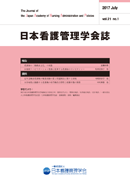
- Issue 2 Pages 87-
- Issue 1 Pages 7-
- |<
- <
- 1
- >
- >|
-
Hiroko Ooka, Sumiko Yoshinaga, Eiko Suzuki2017Volume 21Issue 2 Pages 87-97
Published: December 25, 2017
Released on J-STAGE: December 19, 2017
JOURNAL FREE ACCESSThe purpose of this study is to identify primary factors contributing to the fundamental competencies of working nurses by conducting a self-administered anonymous questionnaire consisting of the following factors: individual attributes, nursing, education, and experience, feelings of self-esteem, career maturity, and fundamental competencies for working persons. The questionnaires were distributed to 1,220 nurses working at two national university hospitals located in Shikoku from June to August 2014. Some 1,142 responses were received (a response rate of 93.6%), out of which 997 valid responses were selected for the study (81.7%). The average age of the respondents was 33.65 ± 10.48 years, with an average of 9.52 ± 9.01 years of nursing experience.
Multiple regression analysis results revealed that the following factors are important for enhancing the fundamental competencies of working nurses: career maturity, feelings of self-esteem, nursing practice, one job status or position, role models, advisors or people one can consult, and involvement in training that requires giving presentations. We observed an especially strong association with career maturity, which suggests that career maturity is the most significant factor for enhancing the fundamental competencies of working nurses.
View full abstractDownload PDF (1151K) -
Keiko Kunie, Minako Sasaki, Mami Onishi2017Volume 21Issue 2 Pages 98-109
Published: December 25, 2017
Released on J-STAGE: December 19, 2017
JOURNAL FREE ACCESSSystems redesigns in hospitals are a way of coping with the changing healthcare environment. Redesign may, however, negatively affect nurses and nursing practice.
The purpose of this study was to clarify nurse managers' behaviors during the course of system redesigns. We used a qualitative study design, and conducted a longitudinal study at three time-points, using interviews and observations on hospital wards that were reorganized. We also conducted retrospective interviews with nurse managers who had experienced hospital reorganization. Data were analyzed based on the Modified Grounded Theory Approach.
The main roles of nurse managers during system reorganizations were to "organize the ward". The nurse managers organized the working environment for the medical staff to ensure mutual agreement among staff members, patient safety, and task performance efficiency. To do so, they drew on four behavioral guidelines and 12 behaviors. The four behavioral guidelines were: "Help the staff nurses to develop a schematic image of their new environment, so they can see their work as a series of movements", "resolve conflicts among medical and other staff on the wards and confirm agreements", "seek mutually agreeable improvements", and "support staff nurses so they can perform their tasks effectively". These four guidelines were needed for the duration of hospital reorganizations. To provide better healthcare in the ward during and after system redesign, the managers organized their work using 12 behaviors under the four behavioral guidelines.
View full abstractDownload PDF (1267K)
- |<
- <
- 1
- >
- >|